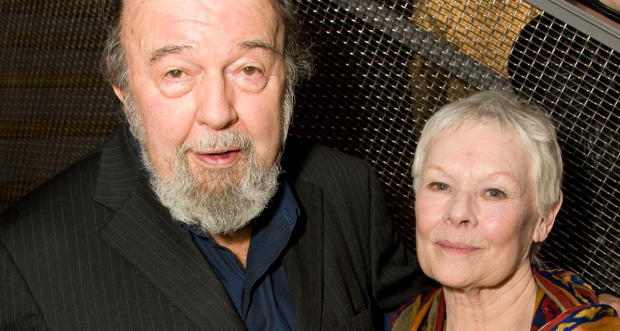Peter Hall: yesterday's pioneer is today's past
Matt Trueman reflects on the legacy of the late National Theatre artistic director and RSC founder

© Dan Wooller for WhatsOnStage
For me and, I suspect, many of my generation, Peter Hall stood for the past. It has, therefore, been rather strange to see him eulogised over the last fortnight; moreover, to find myself in a position to pen something of my own. To be honest, I’ve not known how to begin. More than any other artist, he came to represent a kind of theatre I wanted to see the back of.
I don’t mean any disrespect by that. It’s less a statement about Hall himself, more one about the way the world moves on. But by the time I started going to the theatre regularly, Hall’s best was a long way behind him, and even that felt a long way behind everything else. Besides, I was 17, he was 72. We were never going to be simpatico.
The Peter Hall Company, as he led then, put on proper plays properly, preferably behind a proscenium arch in period dress. It treated classics with the respect and reverence they were due, and it seemed to me stuffy, dogmatic and sedate. It had literary merit, but what of that? It was lifeless. British theatre, meanwhile, was fast moving on. This was 2002-03. I saw my first Caryl Churchill, my first Complicite, Jerry Springer: the Opera, the NT’s Iraq-set Henry V. To me, theatre felt exciting, nimble and fresh.
At school there was Teams Hall and Team Brook, and we all sided with Brook
Even looking back, though, Hall’s best felt antiquated. At school, Theatre Studies felt like a tale of two Peters. There was Team Hall and there was Team Brook, and, back then, every single one of us sided with Brook. Hall’s shows lived in old textbooks and videos. They were black and white stills and grainy, old footage on VHS. The colour had faded; the speech seemed strange. Those leftovers still told you all you needed to know.
Brook’s, by contrast, lived in the imagination. They seemed incapable of being contained. His Midsummer Night’s Dream was so much more than an image of a white box. It made sense on another level. The Mahabharata, all nine hours of it in an Avignon quarry, seemed so vast and ambitious that you just had to be there. It was butterflies burned in protest and Marat/Sade‘s inmates running wild. Even decades later, it still felt alive. That was the theatre I wanted.
I still read Hall’s diaries a few years later – lapped them up, in fact. They gave a rare glimpse into theatrical history, an on-the-ground view, but also into the oddities of its politics and personalities. It’s curious how much of his memory resides in those things – the culture wars he waged, the funding he fought for, the institutions he established and steered through the years. The shows for which he’s celebrated – The Wars of the Roses, The Oresteia, Waiting for Godot, all those Pinters – all struggle to shake the dust off their shoulders. I’m sure they were thrilling to those in the room. Seen from the present, they seem sort of ancient.
It’s funny, though. The things for which Hall’s been most revered are the very things that sit most uncomfortably today – those big institutions. Obituaries have (rightly) heralded him as the architect of post-war British theatre, even as one study after another argues against those same structures.
Hall was, of course, the man who birthed the Royal Shakespeare Company and moved the National into its South Bank home. Both were mammoth undertakings that needed vision in their inception and determination in their execution. Undoubtedly, he changed the theatrical landscape forever and no end of brilliance has stemmed from the starting points he put in place. We’re right to recognise the vast role he played.
And yet, it’s worth remembering that it was one path among possibles. Hall’s vision of British theatre won out over others, but it might have looked very different. Whisper it, but it might have been better.
British theatre might have looked very different, it might have been better
Don’t forget, the National’s staticity has caused issues – London-centricity and, even in Hall's day, keeping the lights on. Both the National Theatre of Scotland and National Theatre Wales opted for roaming 'Without Walls' models in response. We’ve argued, too, against big, funding-drain institutions of late, with two parliamentary committees advocating a greater spread of arts funding and two major reports, The Gulbenkian Enquiry and Towards Cultural Democracy, prioritising engagement and everyday creativity over excellence – ideals that run against the cultural elitism of old.
In all the tributes and obits, one thing caught my eye and stuck with me. It came via Tom Morris at the Bristol Old Vic, who pulled out a line from Hall’s very first speech to his new RSC colleagues in 1963.
"We are lucky," he said. "We don’t have lots of committees, lots of traditions. Our company is young. We are searching, and whatever we find today, a new search will be necessary tomorrow. The theatre is a quest, not an acceptance. Accept a theory and you’ll bypass the creative process and the theory will sit on you like an unlikely false nose."
Here’s the thing about Peter Hall, then. For all that he came to stand for in theatre’s past, he was once its future. In remembering him, rather than remaining in thrall to what he left behind, we should celebrate the changes he caused. To me, Peter Hall was the past, but, before that, he was a pioneer.















